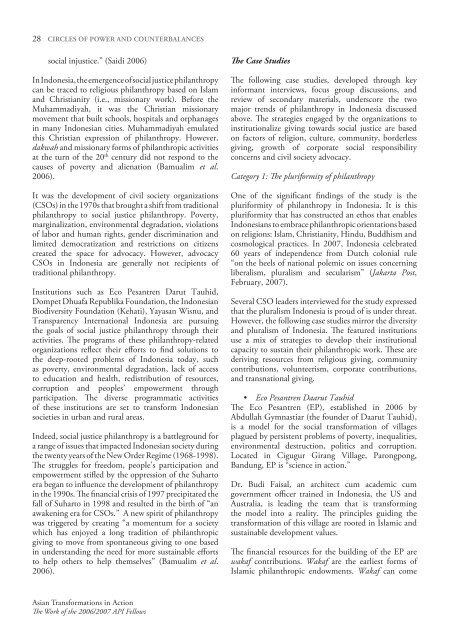Asian Transformations in Action - Api-fellowships.org
Asian Transformations in Action - Api-fellowships.org
Asian Transformations in Action - Api-fellowships.org
You also want an ePaper? Increase the reach of your titles
YUMPU automatically turns print PDFs into web optimized ePapers that Google loves.
28CIRCLES OF POWER AND COUNTERBALANCESsocial <strong>in</strong>justice.” (Saidi 2006)In Indonesia, the emergence of social justice philanthropycan be traced to religious philanthropy based on Islamand Christianity (i.e., missionary work). Before theMuhammadiyah, it was the Christian missionarymovement that built schools, hospitals and orphanages<strong>in</strong> many Indonesian cities. Muhammadiyah emulatedthis Christian expression of philanthropy. However,dakwah and missionary forms of philanthropic activitiesat the turn of the 20 th century did not respond to thecauses of poverty and alienation (Bamualim et al.2006).It was the development of civil society <strong>org</strong>anizations(CSOs) <strong>in</strong> the 1970s that brought a shift from traditionalphilanthropy to social justice philanthropy. Poverty,marg<strong>in</strong>alization, environmental degradation, violationsof labor and human rights, gender discrim<strong>in</strong>ation andlimited democratization and restrictions on citizenscreated the space for advocacy. However, advocacyCSOs <strong>in</strong> Indonesia are generally not recipients oftraditional philanthropy.Institutions such as Eco Pesantren Darut Tauhid,Dompet Dhuafa Republika Foundation, the IndonesianBiodiversity Foundation (Kehati), Yayasan Wisnu, andTransparency International Indonesia are pursu<strong>in</strong>gthe goals of social justice philanthropy through theiractivities. The programs of these philanthropy-related<strong>org</strong>anizations reflect their efforts to f<strong>in</strong>d solutions tothe deep-rooted problems of Indonesia today, suchas poverty, environmental degradation, lack of accessto education and health, redistribution of resources,corruption and peoples’ empowerment throughparticipation. The diverse programmatic activitiesof these <strong>in</strong>stitutions are set to transform Indonesiansocieties <strong>in</strong> urban and rural areas.Indeed, social justice philanthropy is a battleground fora range of issues that impacted Indonesian society dur<strong>in</strong>gthe twenty years of the New Order Regime (1968-1998).The struggles for freedom, people’s participation andempowerment stifled by the oppression of the Suhartoera began to <strong>in</strong>fluence the development of philanthropy<strong>in</strong> the 1990s. The f<strong>in</strong>ancial crisis of 1997 precipitated thefall of Suharto <strong>in</strong> 1998 and resulted <strong>in</strong> the birth of “anawaken<strong>in</strong>g era for CSOs.” A new spirit of philanthropywas triggered by creat<strong>in</strong>g “a momentum for a societywhich has enjoyed a long tradition of philanthropicgiv<strong>in</strong>g to move from spontaneous giv<strong>in</strong>g to one based<strong>in</strong> understand<strong>in</strong>g the need for more susta<strong>in</strong>able effortsto help others to help themselves” (Bamualim et al.2006).The Case StudiesThe follow<strong>in</strong>g case studies, developed through key<strong>in</strong>formant <strong>in</strong>terviews, focus group discussions, andreview of secondary materials, underscore the twomajor trends of philanthropy <strong>in</strong> Indonesia discussedabove. The strategies engaged by the <strong>org</strong>anizations to<strong>in</strong>stitutionalize giv<strong>in</strong>g towards social justice are basedon factors of religion, culture, community, borderlessgiv<strong>in</strong>g, growth of corporate social responsibilityconcerns and civil society advocacy.Category 1: The pluriformity of philanthropyOne of the significant f<strong>in</strong>d<strong>in</strong>gs of the study is thepluriformity of philanthropy <strong>in</strong> Indonesia. It is thispluriformity that has constructed an ethos that enablesIndonesians to embrace philanthropic orientations basedon religions: Islam, Christianity, H<strong>in</strong>du, Buddhism andcosmological practices. In 2007, Indonesia celebrated60 years of <strong>in</strong>dependence from Dutch colonial rule“on the heels of national polemic on issues concern<strong>in</strong>gliberalism, pluralism and secularism” (Jakarta Post,February, 2007).Several CSO leaders <strong>in</strong>terviewed for the study expressedthat the pluralism Indonesia is proud of is under threat.However, the follow<strong>in</strong>g case studies mirror the diversityand pluralism of Indonesia. The featured <strong>in</strong>stitutionsuse a mix of strategies to develop their <strong>in</strong>stitutionalcapacity to susta<strong>in</strong> their philanthropic work. These arederiv<strong>in</strong>g resources from religious giv<strong>in</strong>g, communitycontributions, volunteerism, corporate contributions,and transnational giv<strong>in</strong>g.• Eco Pesantren Daarut TauhidThe Eco Pesantren (EP), established <strong>in</strong> 2006 byAbdullah Gymnastiar (the founder of Daarut Tauhid),is a model for the social transformation of villagesplagued by persistent problems of poverty, <strong>in</strong>equalities,environmental destruction, politics and corruption.Located <strong>in</strong> Cigugur Girang Village, Parongpong,Bandung, EP is “science <strong>in</strong> action.”Dr. Budi Faisal, an architect cum academic cumgovernment officer tra<strong>in</strong>ed <strong>in</strong> Indonesia, the US andAustralia, is lead<strong>in</strong>g the team that is transform<strong>in</strong>gthe model <strong>in</strong>to a reality. The pr<strong>in</strong>ciples guid<strong>in</strong>g thetransformation of this village are rooted <strong>in</strong> Islamic andsusta<strong>in</strong>able development values.The f<strong>in</strong>ancial resources for the build<strong>in</strong>g of the EP arewakaf contributions. Wakaf are the earliest forms ofIslamic philanthropic endowments. Wakaf can come<strong>Asian</strong> <strong>Transformations</strong> <strong>in</strong> <strong>Action</strong>The Work of the 2006/2007 API Fellows
















